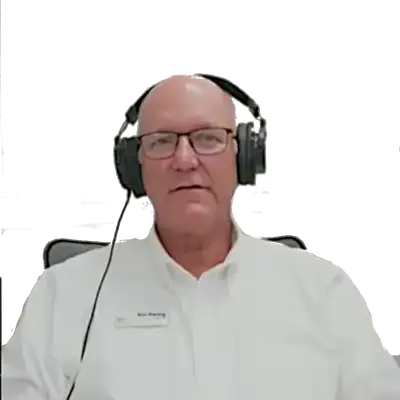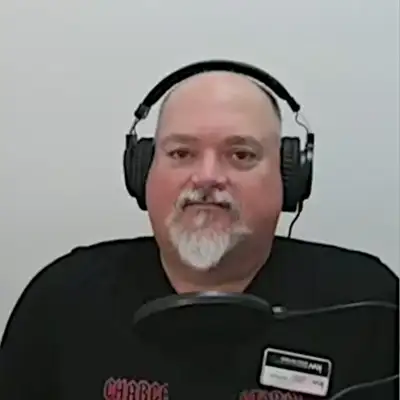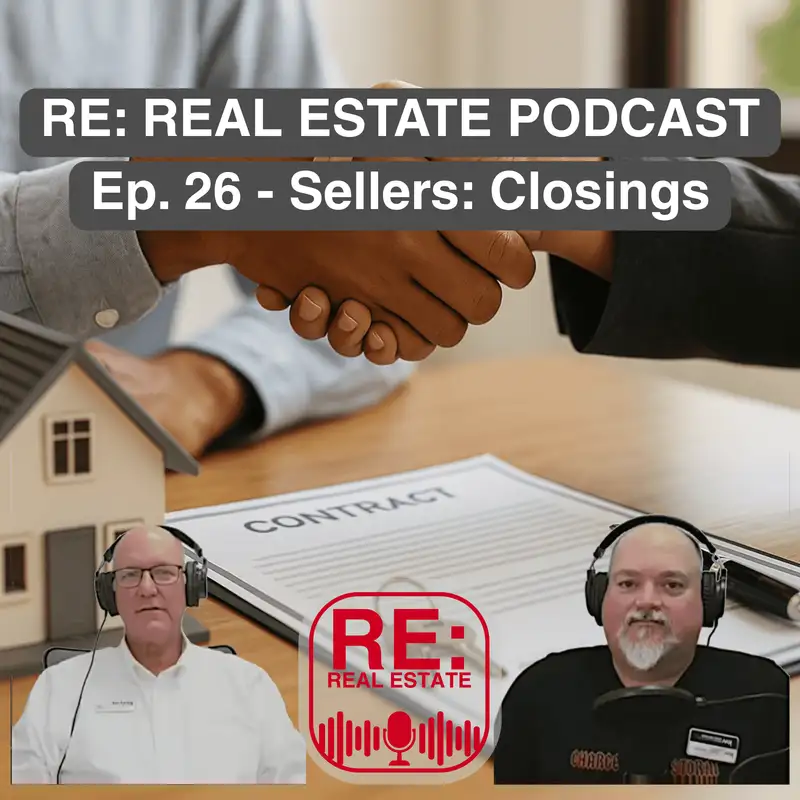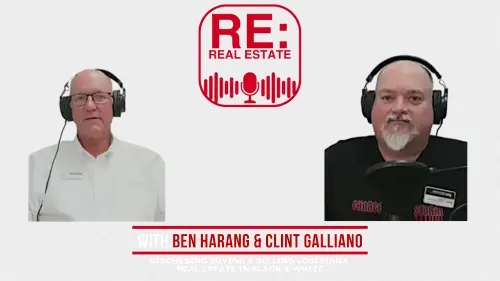Ep. 26 - Sellers: Closing
Clint C. Galliano (00:03)
Hey Ben, how you doing?
Ben Harang (00:05)
Clint, good afternoon. I'm doing terrific, man. How you doing?
Clint C. Galliano (00:10)
I'm doing wonderful. We're sitting here on this wonderful afternoon. We're running around this morning. We're going to run around this afternoon. We've got to close in this afternoon. So it's a beautiful day.
Ben Harang (00:25)
Congratulations, it's always a good day to have a closing.
Clint C. Galliano (00:29)
Indeed indeed.
Ben Harang (00:31)
So what's the topic today?
Clint C. Galliano (00:35)
funny you should ask. Today we're talking about closings for sellers.
Ben Harang (00:40)
Awesome awesome We were we were talking before we started recording about if if everything goes according to plan it Hopefully is a pleasant experience at the closing for both the buyer and the seller ⁓ So that's what everybody's goal is when properties listed when somebody's looking for a house their goal is to get the
to the closing table so everybody can move on with their life. So we're going talk about a few things today that hopefully will help us get to the closing in good shape and it be a pleasant experience.
Clint C. Galliano (01:19)
Yep, that's the idea. ⁓ I mean, I'm on the buy side on this one, but ultimately it was a really, I don't think what led to the sale was probably pleasant ⁓ because it was a family breaking up, but the whole sale process was a pleasant experience. ⁓ So that's ultimately what you want.
Ben Harang (01:48)
Yeah, and unfortunately, ⁓ life happens to people and... ⁓
people separating, getting divorced are a big part of the real estate business and why sometimes the house is listed. So you just take everything in stride and make it as pleasant as we can for everybody involved.
Clint C. Galliano (02:16)
Now, so the closing. All right, so we talked about the closing on the buyer side. When we show up for the closing, well, prior to showing up for the closing, we'll get a closing disclosure that should be the exact same thing that we're gonna see when we get to the closing. And ultimately that's gonna show
what expenses the seller has, ⁓ whether it's compensation to the agents, ⁓ mortgage payoff, mortgage cancellation fees, title fees, what have you. ⁓ If you get your termite ⁓ inspection done and
don't pay it outright, then that can be taken out of the closing. Any other bills and what have you or concessions that are being paid out, as closing costs paid on the buyer's behalf, things like that, that all gets documented in the closing disclosure. ⁓ Sellers get that two to three days before the closing. Buyers get their own.
that's a little bit more detailed. talked about that on another episode. But as a seller, you get that, you review it, make sure it looks okay. And then it also tells you the net amount of money that you're getting back as proceeds from the sale.
Ben Harang (03:59)
Another item that's probably going to be in there for the sale on both sides is the proration of the property taxes. And there's a lot of confusion generally, but we pay the property taxes for the current year at the end of the year. So the seller is charged from January 1st through
to Clint's closing today of, I'm forgetting what day it is, April 30th. So they'll pay 4/12ths or one third of the estimated annual property taxes that'll be transferred from the seller to the buyer at the closing. And the buyer or the lender are responsible for 100 % of the property taxes by December 31st. ⁓
Clint C. Galliano (04:25)
Yeah.
Ben Harang (04:45)
And always found it interesting that we'll get the closing disclosure. We used to call it the settlement statement of the HUD-1. And there are all kinds of privacy concerns going on for the buyer. The seller, not so much. Everybody in the world sees the seller's business. How much they owe, who they owe it to, and how much their checks are going to be. ⁓
how much they pay on the agents, just everything involved. The buyer, the seller sees none of it, but the buyer sees the seller. So I always thought that was interesting that the buyer had all the privacy, didn't want to, nobody can have access to their financial information, which I get. I don't get why everybody has ⁓ access to the seller's financial situation.
A ⁓ tidbit on my part, that's all.
Clint C. Galliano (05:45)
Yeah, just a quirk. ⁓
You would think it would be set up, but everybody's worried about protecting the buyers and they don't care about the sellers because nine times out of 10, the seller's walking away with money in their pockets. So hey, they're profiting. Sometimes yes, sometimes no, but...
Ben Harang (05:59)
Right.
Clint C. Galliano (06:12)
That's the general mindset. Everybody's got to bubble wrap the buyers.
Ben Harang (06:17)
Right.
Clint C. Galliano (06:20)
So some of the other things ⁓ when we show up, same thing as we talked about with buyers, everybody that's signing paperwork has to provide some form of ID, driver's license or what have you to verify that you are who you are. ⁓ Hopefully as a seller, you're not bringing cash to the closing.
Ben Harang (06:47)
It stings.
Clint C. Galliano (06:47)
Ideally, you want to walk
away with some type of net proceeds. Sometimes you may, and we've got this going on, where some of the repairs that the sellers agreed to do, they were not able to complete due to back-ordered parts. So they're going to bring a check to closing to give to the buyer to cover the balance of those repairs.
Ben Harang (06:52)
Yeah.
Clint C. Galliano (07:15)
You know, which is, that's not an uncommon thing.
Ben Harang (07:17)
Right. Especially with the supply chain issues that we've had in the past and we may be having again.
Clint C. Galliano (07:26)
Yeah. So what else goes on on the closing bit?
Ben Harang (07:28)
So.
Well, one of the things that, that the lawyers or the, yeah, the attorneys at close want to confirm is that things such, such simple things as the sales price. ⁓ did we get the sales price right? Did the, the attorney and lender get the final agreed upon counter offer or did the price change as a result of the inspections and or the appraisal?
as a lot of times, unfortunately, we, we go to a closing and the attorney for whatever reason doesn't have the, the final accepted document, whether it's the renegotiated inspections or the appraisal or a final counter offer that didn't get sent to them.
So we like to see it a couple of days out just to make sure. ⁓ And I'll send it to them regardless if I should be or not, just so they have it. ⁓ And they can compare what I send them to what they have. And if it's different, we can have a conversation about it to make sure it's right at the closing.
brings a comment we had at a meeting this week about ⁓ offers and counter offers. Differing opinions about how many counter offers should there be before we just rewrite a new purchase agreement. ⁓ So if you're to have multiple counter offers, we need to make sure that everybody has them. And Clint's view, after one counter offer should ⁓
write a new purchase agreement so that doesn't happen and that's not a bad idea. ⁓ It's just two different ways of accomplishing the same thing.
Clint C. Galliano (09:28)
Yeah, and I mean, part of it is that from my perspective, the technology we have writing a new purchase agreement is very simple. ⁓ We make the changes, it saves everything as far as the details of what we've written in the original purchase agreement. And instead of writing a counter offer,
Ben Harang (09:45)
Mm-hmm.
Clint C. Galliano (09:53)
and having to restate the parts of the counter offer from the other party that we want to keep and then add or, well, yeah, I guess it would be add terms that we want to add to it rather than creating a document with all of that from whole cloth. We'll just write a new counter offer that's got the majority of the terms in it.
changes, specific things that we need to change. know, if we're writing, if we say we agreed on a new price rather than writing a counter offer that says line such and such to read and writing in the price, I'll just write a new purchase agreement with the new price as opposed to all the extra text because I'm lazy.
Ben Harang (10:46)
And also it brings up ⁓ what we refer to as countering the offer or countering the counter offer. ⁓ And I thought everybody had kind of seen the light and we go back to the original offer to make the first, second, third, 10th counter offer. Anything that happens in between didn't happen because it wasn't agreed to, but some people
Me included how we used to do it. used to stack the counters and we would only change the things that changed after counteroffer number one or two or three. So if we had five counteroffers, we literally had to put counteroffers one through five plus the purchase agreement to get to the end result. A cumbersome way to do it, whether that was ever actually the right way to do it, I don't know. We don't do it that way anymore. It's the purchase agreement and whatever counteroffer we're dealing with.
So the issue is some people think we need to include all account or offers in between. ⁓ So anyway, Clint's way is probably a cleaner way to do it. ⁓ It's just what, people choose to run their business. And I'm, I'm, and I'm leaning, I'm leaning towards doing it after I argued about not doing it, but ⁓ you know,
Clint C. Galliano (12:02)
Yeah, what they feel like they're used to.
Ben Harang (12:12)
The, and the thing that, that, gets me is I was actually doing that.
We, I was countering back to the original offer and, ⁓ there was going to be confusion on the other side about us, about the sales price. So I had to restate the sales price that was in the original offer. anyway, said I wasn't gonna tell stories this week, but, I did. And just think if I decided not to do it, you know, if I wouldn't have decided not to do it.
Clint C. Galliano (12:39)
We got three stories already and not just from you.
Right, right.
Ben Harang (12:50)
so anyway, the,
Clint C. Galliano (12:50)
So. ⁓
Ben Harang (12:52)
the, point, a long way to say it is we make sure that the title attorney has the, the accurate information they have to prepare their paperwork. So when we show up for the closing, we can talk pleasantries and good luck and hope you enjoy the house and, things like that.
Clint C. Galliano (13:13)
Yeah, so even though this is the closing from the seller side, and it's not our responsibility to ensure the buyers do a final walkthrough, we do want to ensure that or facilitate making it easy for them. So we want to make sure that as sellers, you've got
everything out of the way moved out or at minimum packed up so they can walk through. We want to make sure that any changes, repairs, replacements, what have you that were agreed to in either the purchase agreement or the subsequent due diligence and inspection period, that those are completed.
Along with that, I guess that ties into make sure that all contingencies that were specified in the purchase agreement, that those were all met also. So we don't want, ⁓ and we talked about this in our team meeting yesterday also, is a question about how would you react to it that you show up for closing and the sellers are...
expecting to move out in two weeks after the closing that they need two weeks to move. So, you know, don't expect that. The purchase agreement says that buyers take possession at closing. So make sure you're aware of that, that you need to be out of there, have the place clean so that when the buyers sign the paperwork, they get the keys and they can start moving in.
Ben Harang (14:47)
Yeah.
And it's our job as the listing agent to convey the terms of the purchase agreement to the seller so that they understand their, when we go to the closing, they're not going back to that house because it's no longer theirs. They need to be out prior to closing. Unless there's a post-occupancy agreement, which I'm generally not a fan of because too many things can get sideways. But the...
I like to go through the house four or five days before we close just to kind of see if the things are done that they said they were going to do as a buyer's agent ⁓ and kind of pick up on any problems with the seller moving out. ⁓ So it gives us some time to maybe fix a couple of hiccups.
So we're not trying to fix it before 10 a.m. closing on a Friday morning.
So.
Clint C. Galliano (16:07)
So
other than that, ⁓
Mainly we get in the closing. Typically, as long as the buyers show up early enough, they'll take the buyers in first. Some attorneys are different and bring everybody into the room and make everybody wait until everything's done. But a lot of the attorneys like to take the buyers in first and start the paperwork because the buyers usually have a stack of paperwork to sign. They're not only signing the act of sale, they're also signing their mortgage documents.
and everything for the loans they're making. Cash sales are different. It's just the act of sale. Everybody confirms that their closing disclosures are correct. They sign that. They sign the Wood Destroying Insect Report or WDIR. Both parties sign that. for when buyers are purchasing with a loan,
they get the short end of the stick from the signing perspective. Sellers sign two, maybe three things and they're done. And then they just sit there and wait to get their check. So that's what you can expect as a seller.
Ben Harang (17:23)
And you can also expect ⁓ two different times, whether you're closing today starts at four o'clock and the sellers come at four 30 or everybody shows up at four and the sellers sit in the lobby ⁓ or the waiting room. But some attorneys will bring in the buyers half an hour before the sellers, just so the sellers are not hanging around looking at each other for nothing. Basically while the, the attorney and the lender and the
the buyers are doing the the mortgage and the paperwork for the lender. So just have some patience. It typically is about an hour long process if everything goes goes well. Don't expect to get in and get out in 15 minutes. But at the end of an hour or within an hour everything should be done and everybody should be on their way.
Clint C. Galliano (18:14)
and be prepared because some attorneys will want to know who your family is and try and figure out who they know in your family. And this could lead to ⁓ discussions about stories and what have you. ⁓ On top of that, some attorneys will also go on about
Ben Harang (18:21)
you
Clint C. Galliano (18:40)
how if you have any real estate questions or friends that are buying or selling that you need to talk to your rock star real estate agents because these two agents that are at the closing table with you, whether you're buying or selling, that they're the best agents in the world. But then, that's right. But that's okay. It's always good to be flattered. ⁓
Ben Harang (18:59)
And it doesn't matter who those agents are.
Yeah ⁓
Clint C. Galliano (19:08)
⁓
We love working with those ⁓ closing attorneys.
Ben Harang (19:12)
that we do the what another thing from the this is more from the buyer side but the utilities need to be transferred because the sellers not interested in paying anybody else's utility bills so it's incumbent upon
Clint C. Galliano (19:25)
Speaking of it from
the seller side, don't schedule to get it turned off. Leave the utilities on. The buyer will set up their accounts and have everything transferred to their name and the utilities will close out the final bill and send you the balance of your deposit.
Ben Harang (19:30)
True.
It's a lot easier to not turn the utilities off than to turn them off and turn them back on.
Clint C. Galliano (19:50)
So
funny little story. ⁓ I've worked with clients getting gas turned on and I've had gas turned on myself in Terrebonne Parish and in St. Mary Parish and that involved getting a plumber out to do in the old days apparently they'd pump mercury into the gas lines to look for leaks. Now they just pressure it up with air and see if it holds that pressure and then wait for
Ben Harang (20:18)
Mm-hmm.
Clint C. Galliano (20:19)
an inspector to come out and inspect it. And once they verify that, then they come back and say, okay, you get to go and hook up the gas. On my townhouse in Natchitoches, it was, I think it was Atmos, was the gas company.
Ben Harang (20:34)
Mm-hmm.
Clint C. Galliano (20:35)
They sent a technician out. He pumped it up himself, brought the test equipment, tested everything, says, okay, it's held for a minute. It's good. Hooked up the gas meter, turned the gas on, and then went in and lit the pilot lights and stuff for me. And it's like, holy mackerel. I was in shock. It's like, my God, I don't have to do anything. Because I was concerned because the person I bought it from
Ben Harang (20:49)
That's about as efficient as I've ever heard.
Mm-hmm.
Clint C. Galliano (21:03)
had gotten all the utilities turned off or scheduled to be turned off and before I could schedule them to turn it back on they'd already shut off the gas.
Ben Harang (21:11)
Yeah,
it's just it's a courtesy to leave it on it might take a day or two After the closing some some utility companies will require the cash sale Sometimes you can do it with a purchase agreement ⁓ But just have a little patience for a day or three on the Utilities from the seller side and the buyers just need to get on it as soon as they can No, yeah, i'm gonna get to that next week. No, you don't get to that next week you get to that
after the closing like home state exemption, water, electricity, gas, whatever you need to do, go ahead and get it done.
Clint C. Galliano (21:51)
So another thing that it's not part of the closing, but once you have closed on the property is reach out to your insurance company and let them know that you've sold the property so that if there's any ⁓ refundable premium left that you can get that back from them. And if you're paying a mortgage, ⁓ it'll take a little while for them to refund you your escrow and everything like that, the balance.
Ben Harang (22:10)
And I'll
Clint C. Galliano (22:20)
of that, but let the insurance company know right away so that they can stop charging you premium on that day.
Ben Harang (22:26)
And my recommendation with a background in insurance is to cancel it the day after the closing because when you cancel it, they'll cancel it at 1201 a.m. the day you cancel it. So if you're closing at four o'clock and something happened that you're not aware of yet and you close you close today and cancel it today, it cancels it to 1201 a.m. this morning. So cancel it tomorrow at 1201 a.m. Just I've seen somebody get get
getting a bind because of something like that. So, like...
Clint C. Galliano (23:03)
We got all the risk
mitigation ⁓ strategies.
Ben Harang (23:08)
If they'd only listen to us, Clint, the world would be a better place.
Clint C. Galliano (23:12)
Indeed, indeed.
Ben Harang (23:14)
All right. I think that's all I had about clothing, Clint. Anything else?
Clint C. Galliano (23:20)
Nope, I think we've covered all the pertinent stuff and told a few stories and I did, I did.
Ben Harang (23:26)
I think you told more than me today, so that's
All right. If y'all, if y'all see any value in these podcasts, ⁓ please like, share and subscribe to them on your favorite platform. ⁓ Clint likes the audio version. liked the video version. but either way, whatever you like, we should have it there. Whether it's on YouTube or Spotify or Pandora or Apple or, I heart.
They're they're everywhere if you if you do a search for re real estate podcast all one word no spaces no colon You should ⁓ you should be able to get it or you can go to the re real estate podcast dot-com website And there's audio and video versions right there for you to see So what did I miss Clint?
Clint C. Galliano (24:20)
⁓ You can comment on the YouTube videos or ⁓ you can also comment on if you've got a question or what have you. You go to the website rerealestatepodcast.com and we've got a link there where you can ask a question. You go ahead and submit your questions and we'll answer it on a future podcast.
Ben Harang (24:46)
Alright, now that we got all the housekeeping out of the way, go to closing and hopefully it's a pleasant one and everybody can move on with their life. Y'all have a great day.
Clint C. Galliano (24:59)
See y'all. Thank you, Ben.
Creators and Guests



